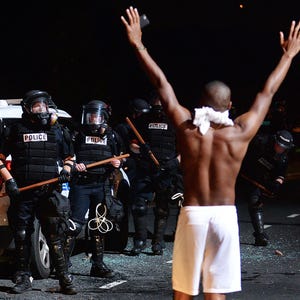My grandfather died last week.
He lived as colored and negro before he was ever granted
black or African American. A world war two veteran, he risked his life for
America only to return to its abuses. Somehow he survived. Somehow he thrived. Sent his three
children to college, traveled the world, lived just two months shy of 100 years.
I find that last bit the most remarkable.
Ninety-nine years in America is a long time for a black man. Hell, 12
is a ripe old age for a black man in America, I say with every ounce of irony I
can conjure.
Years ago I had a conversation about the ills of
racism in America with PaPa. He was adamant that I focus on how far we have
come. He pointed out that the descriptors on my birth certificate mark some
level of change, of progress.“Does that mean we should stop?” I asked him. “If no one is flinging ‘nigger’ at me does
that mean I should be satisfied?”
He stopped for a moment. Looked at me and then shook his
head. No. No we shouldn’t stop.
 For some reason my grandfather, my PaPa, is running
through my head as I am waiting for BART to arrive, coming to the end of an
8-day trip book-ended by my PaPa’s funeral in Houston on one end and a
conference in Philadelphia on the other.
For some reason my grandfather, my PaPa, is running
through my head as I am waiting for BART to arrive, coming to the end of an
8-day trip book-ended by my PaPa’s funeral in Houston on one end and a
conference in Philadelphia on the other.
My thoughts are heavy. It could be exhaustion or maybe reflecting on my
grandfather’s journey through life provides the perfect canvas to paint all my
grief all my loss, both personal and social.
Us gunned down in the street by agents of the state requires
deliberation and evidence before the loss of life can be deemed tragic or
unjustified by the American masses. Video isn’t enough, we need sound. We are guilty until proven
innocent…guilty of what I am unsure.
I hopped online when my plane landed and Twitter, awash in RIP hashtags and outrage and mourning, brought me to tears. Just like that. Visions of every black and brown person I’ve ever loved swim before me because our lives are clearly viewed as disposable.
Maybe its our melanin. Maybe it is the visible proof of the
enslavement written epigenetically in all of our progeny. Yeah,
maybe we are a reminder of America's original sins of genocide and torture and it just can’t
bare it, just won’t. America has to wash us out Lady Macbeth style- damn spots
that we are.
I thought I was out of tears for all of this. Cried out when Zimmerman was
released into the wild like some poisonous gas. But there have been so many…so
many more. So many that the names begin to jumble and the timeline
is a mess in my head because we are daily targets and nothing, not body cameras or being a
child or respectability politics that demand we comply with raised hands, saves
us. Our black and brown bodies are shot over and over and over again.
And like entertainment, like the lynching postcards of old,
those bodies are displayed on a loop. A warning. This is what I can do boy/gal.
This is what you are worth. This is how little America cares.
I can’t bring myself to ask right now…can’t bring myself to
beg for America to stop murdering us. It seems insane to beg for my humanity
from the very thing stripping it daily.But yesterday my friend of 22 years, my 6'2 brown skinned brother, drove 2
hours to see me, to share a meal. And we laughed and we debated and we
reminisced. And then he got into a car and drove two hours home through the
dark Pennsylvania and Maryland night with only a thin layer of metal and wisp
of grace to see him safely home.
And for him I asked. For him and every person I love that has
been kissed by some variant of brown I will continue to ask…please stop. Please
stop killing us. Please. Stop.
At church on Saturday we celebrated my PaPa’s long life. We
shared stories of his driving on long road trips and ability to eat any meal no
matter ow horribly prepared. We marveled at how much the world has changed in
the hyphen he lived between 1916 – 2016. He carried a computer in his pocket
and waved at his granddaughter in Uganda through Skype.
All that and the thing that strikes me the most as I arrange
my thinking to a world that no longer includes him, is not all of the changes
he experienced, but how black people’s place in it has stayed so very much the
same.



